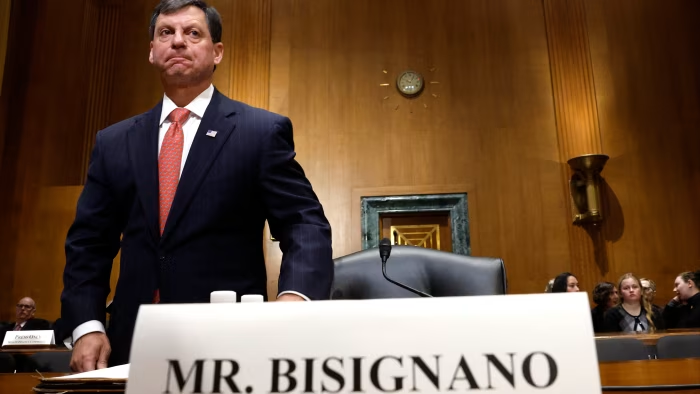When Donald Trump nominated Fiserv chief executive Frank Bisignano to serve in his administration 11 months ago, his company was held up as a Wall Street fintech darling alongside the likes of Visa and Mastercard.
Now the business Bisignano helped build is in freefall.
Shares of Fiserv, which runs back-end technology for banks and payment networks, fell 44 per cent and lost $30bn in market value after disastrous third-quarter results on Wednesday. The company disclosed several problems that had been festering for years and analysts described the earnings as “shocking” and “impossible to sugarcoat”.
But Bisignano already cashed out, selling 3.3mn Fiserv shares worth more than $500mn at the time of his Senate confirmation in May, and deferring taxes on the gains. Today, the shares would be worth about $220mn.
Now questions are being raised about the company’s management under the leadership of Bisignano, who has been tapped by Trump to manage two of the government’s most crucial financial operations — the Internal Revenue Service and the Social Security Administration. One collects more than $5tn in annual tax revenue and the other makes more than $1.6tn in yearly payments to senior citizens.
“To see a company that 12 months ago had a sterling reputation fall off like this and finish the day down 44 per cent, it is the most shocking earnings print I’ve had in my time covering the space,” Deutsche Bank analyst Nate Svensson said.
New Fiserv chief executive Mike Lyons, in the job since Bisignano’s resignation in May, said an analysis had revealed ill-fated decisions to defer investments and cut costs, as well as a reliance on short-term initiatives to maximise quarterly results.
“As a result, we have made the decision to deprioritise the short-term revenue and expense initiatives which, of course, has some near-term impact on our growth and profitability,” Lyons told analysts.
The company is now facing shareholder lawsuits alleging it misled investors. Fiserv declined to comment. Bisignano did not respond to requests for comment.
Wisconsin-based Fiserv was founded in 1984. The company as it is today is the result of a merger between Fiserv and First Data, where Bisignano was the CEO.
The deal brought together Fiserv’s sticky but low growth core banking system business with First Data’s higher-growth merchant solutions business, which provided payment processing systems such as credit card readers for small and large businesses as well as ecommerce services.

Before Fiserv and First Data, Bisignano, 66, was a top executive at JPMorgan Chase, reporting to chief executive Jamie Dimon. Internally, he earned a reputation as a savvy operator but also someone who could blur the lines between company matters and his personal life.
Bisignano was known to invite family and friends to the corporate box at MetLife Stadium to watch the New York Giants NFL team, even when he was not in attendance, and for his frequent use of the company’s private plane, according to executives who worked with him at the time.
His relationship with Dimon eventually soured, according to people familiar with the matter, and he left JPMorgan to join First Data in 2013. In 2017, his pay there reached $100mn. JPMorgan declined to comment.
Bisignano took over the combined Fiserv/First Data company in 2020. It emerged as an industry winner, outperforming rivals such as FIS and GPN. Fiserv’s standout business was its Clover point-of-sale payments terminals.
Bisignano and his wife Tracy were significant donors to Trump’s 2024 and 2020 presidential campaigns before he was recruited to run the social security programme and take the newly created role of IRS chief executive reporting to Treasury secretary Scott Bessent. A Treasury department spokesperson did not respond to requests for comment.

In October 2024, a few weeks before election day, Tracy gave $924,600 to the Trump 47 Committee, the maximum an individual could give to the joint fundraising Pac, and nearly $800,000 split between the Republican National Committee and dozens of local Republican party groups.
At Fiserv, the image of a stable business with solid growth potential has been shattered. The company on Wednesday widely missed analysts’ estimates in quarterly results and slashed its outlook for organic revenue growth in 2025 from 10 per cent to as low as 3.5 per cent.
Lyons detailed that its business in Argentina, which has been supported by the country’s high interest rates and hyperinflation, had been a bigger driver of growth than investors previously believed. He talked about reversing price increases that the prior leadership had made and a need to “overhaul” the client experience for its Clover product.
“At Fiserv there was a lot of restructuring, a lot of cost takeout. I don’t think there was investment in places that needed investment,” said Ali Raza, managing principal at Blue Leviathan, a consulting firm focused on payments. “So we have what we have now.”
Lyons is now tasked with turning the company around. He has put in place a new chief financial officer, three new board members and new co-presidents.
He has talked about resetting the company’s culture to one that prioritises integrity, fairness, execution, accountability and client service, changes that will take time to implement.
“Leaving aside what’s happening with the financials,” said Deutsche’s Svensson, “that is not something you can wave the magic wand and fix overnight”.
